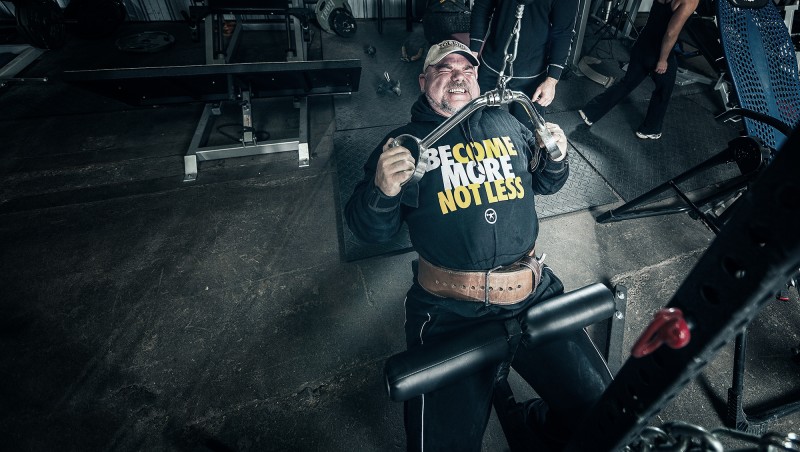
As a fan, coach, and competitor of men’s bodybuilding I have always been interested in what drives us. What we do is so outside the norm; we purposely put our bodies through pain, and discomfort. We diet to extreme levels, and exercise to the point of exhaustion. Competing is very hard. It necessitates a strong will, and a iron constitution.
It can test a person on many levels, but what drives someone past being just a competitor? What makes a champion? What sets them apart? I interviewed two new IFBB Pro Bodybuilders, Mark Eperlding, and Bryan Balzano. Mark won the Masters Nationals last year to earn his pro card. Bryan won the overall at the Mike Francois Classic, and went on to win Nationals, his second show ever. Here is the interview that sheds light on the psychology of a champion:
Training can be very demanding. How do you mentally prepare for training? Is there any process you go through? And once you start, does a switch click and your demeanor change or are you easygoing?
BRYAN: I don’t mentally prepare for training. It’s been such a daily part of my routine that it has become a lifestyle. I am a planner, from training to the meals I eat every day. I like to know what I am going to be doing that day, that hour and that minute. I basically map out all the exercises I am going to do. I always strive for constant variation for each muscle. As a result, I never duplicate the same exercises. I believe that variation in the exercises and tempos create more muscle growth that doing the same routine each week. My demeanor is that I concentrate on my body. It’s my main focus. Quiet, calm and collected… but always concentrated on improving myself mentally and physically.
MARK: From the minute I wake up, I know exactly how and what I am going to train and what I am going to accomplish. It is on my mind all day. Every day is planned out ahead with diet, cardio and training for the end result in mind. There is no switching because I have had all day planned and follow through with everything. I don’t mind joking around during a set. I like to have fun, but with every set I train hard.
How does your focus change on different exercises? Do you have a powerlifter mentality on some exercises, such as deadlifts or squats? (For instance, for a compound movement like squats are you thinking about performance queues, or during an isolation movement are you thinking about contracting the muscle, instead of just moving the weight from point A to B.)
MARK:I have the same focus on any exercise. However, I progressively train harder. My focus is extremely intense on the right form with getting the most out of each positive, negative and static contraction and taking it beyond failure. I never move it from point A to B. I always focus on time under tension.
BRYAN: I focus on slow controlled reps on pretty much all the exercises I do. I don’t have a powerlifter mentality, nor do I try to throw heavy weight. I lift smart, not hard. Lifting hard you lose control on the form and then put all the stress and loads elsewhere than on the target muscle. Form is the most important aspect. Essentially, how I break it down is when it comes to compound movements; slow and controlled movements that put constant tension on the muscle. When it comes to isolations, I do the same slow and controlled movements but with added pauses, iso-tension holds, and timed squeezed reps at contraction. One should never just go to a gym and move weight from A to B if you want to be a bodybuilder.
Training can be difficult on its own, but there are typical gym annoyances that can make it even more challenging. How do you avoid distractions while training?
BRYAN: When working out, I portray that I am in the “zone.” Typically most people at the gym realize when I am in the “zone” and tend to not interrupt my workout. Although I do have some instances where I do have people small talk with me while working out. I give them a minute or two and then try for subtle hints: looking at clock or grabbing the equipment to start my next set. Typically, those hints all work, although sometimes I do end up talking with the one person who doesn’t understand the hints. I am just very honest and respectful and just ask if we can finish the conversation after the gym.
MARK: I try to avoid distractions, but I try to be accommodating and helpful but keeping my mind on my exercise.
Are there any mental tricks you use to get you through an especially tough workout?
MARK: Keeping my mind on the prize keeps me focused on my workout. I sometimes dread leg day, but I know I have to do it, so I just go and, once at the gym, my adrenaline helps push me through.
BRYAN: I wouldn’t say I have any tricks that I use. I think it’s really all up to training the mind not the body. I feel although sometimes when I am doing five or more working sets and I don’t want to, my mind is already made up that I have to. In the end, it’s not what you want, it’s must you must do.
Many people do not understand how difficult it is to prepare for a show. What do you do mentally to get through the rigors of contest prep?
MARK: I wean myself into a diet by starting early and slowly cutting things out. Closer to the show, when things are tough, I get my mind on to the off-season and getting big. That is my favorite part.
BRYAN: I try to have a blank mind. Having a clear and relaxed mind with no worries, at a high stress time, makes the whole process a lot easier. This goes along with my philosophy of extreme self-control and willpower. All the hardships, rigors and urges that a person goes through during prep are all overemphasized and become illusions. It’s all mental. Once that person can keep a clear and relaxed mind, you won’t need any tricks to get through prep.
Most people would not challenge themselves to the extent you have and would not push through adversity. What have you done in order to keep your eye on your goal without giving up?
MARK: Unfortunately, it is a selfish sport and I have had to fight to keep going at this sport whenever someone else wanted me to “grow up”, “get a real job” or quit. I just couldn’t. I fought hard to keep going and spent a lot of money to get here. I had a lot to prove to myself. This is what I want to be the best at!
BRYAN: Vision. I constantly see what I want, every time I look in the mirror. In this sport, there are no shortcuts, or anybody to help you out. This sport is about you, your mind, and your body. You must dedicate yourself day in and day out, and accept that if you don’t, you only have yourself to blame. I believe your body is a reflection of your past decisions. If you want to change your body then you must start right now. I remember my past and see where I have come from and think about the work it took me to get where I am now. It makes me want to make sure I don’t want to go to my “previous self” or stay the same. All this reinforces me to keep doing what I am doing and always improving.
Speaking of keeping your eye on the prize, how do you handle, or have you handled roadblocks that have come up during your career?
MARK: I have had many roadblocks that delayed my career. Between taking care to always be healthy, and financially paying for this sport, I keep going. It just slowed me down. However, making sure that I am always medically checked out will keep my career going longer than many.
BRYAN: “No excuses” is the motto I live by. No matter what happens, if there is a will there is a way. There’s no excuse to let any road blocks halt or stop your passion. It may not be the clear cut easy path that your originally thought to get there. But there is always a way! We are all dealt a different hand of cards and we have to play the cards we were dealt. There is no excuse to quit and not achieve what the mind sees, we all have the ability to achieve what we want. It’s a matter of following through and seizing what you feel is rightfully yours!
What do you think is different about the mentality of a champion?
MARK: I think the mentality of a champion differs. A champion knows what has to be done and does it, and anyone else wants to do the work but doesn’t fully commit.
BRYAN: The mentality of a champion is someone who is never satisfied, because you can never be if you want to be great. Even when you achieve greatness, it doesn’t stop there. Being a legend is next. Any true champion (sports, business or any other kind of champion) has no end in sight. As a champion, I believe you challenge yourself every day, until your last breath.
If you look through their answers you will find some differences, but what is fascinating is that even with their difference in experience, their mindsets are more alike than different. Could this be coincidence or could these similarities be part of the formula that makes a champion? Perhaps it is a change of thinking that may propel us to the next level.
David Samuals began competing at the age of 21. He loved it and spent the next 14 years training and educating himself. At the age of 35, he's currently a Bodybuilding/Fitness coach, NASM CPT (Certified Personal Trainer), FNS (Fitness Nutrition Specialist), owner of Doberman Fitness Concepts, Freelance Writer, and NPC Masters Bodybuilding competitor.











1 Comment